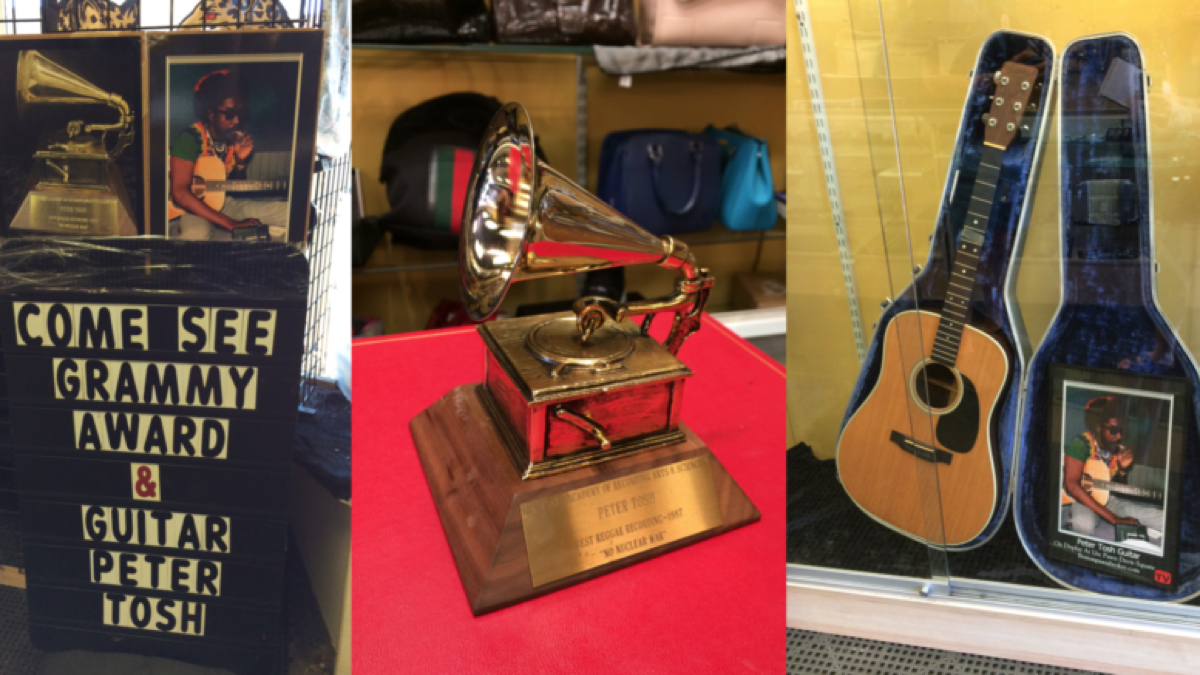How Did a Reggae Legend’s Grammy End Up in a Somerville Pawn Shop?

Photos courtesy of Reena Karasin / Scout Somerville
Passersby in Davis Square were greeted by an unusual sight at the LBC Boutique & Loan pawn shop over the weekend: an invitation to see a real-life Grammy in person.
The gold-plated showpiece, given posthumously to the late Jamaican artist Peter Tosh for Best Reggae Album in 1988, now sits on a shelf in the storefront along with one of the singer’s guitars.
The story of the unlikely acquisition has made the rounds online, showing up in Scout Somerville and also in a news item on the celebrity gossip site TMZ (which declared that the unnamed family member who signed it over “totally sold him out.”).
A relative of Tosh’s (he died in 1987) pawned the pieces of music history in March for a loan, says assistant manager Merion Yohannes. It became the store’s property when its owner failed to pay back the money he or she had been lent.
Yohannes says the shop had kept the Grammy in storage, but put it on display once it learned TMZ found out about the award. And it’s been a big draw, he says, for people looking to snap selfies with the musical artifact. A lucky few have even gotten to hold it in their hands.
“This I can tell you was the busiest Sunday ever,” he says, adding that it’s become the most interesting piece in the shop’s collection — which, he says, includes Super Bowl rings and Whitey Bulger collectibles.
Tosh’s guitar is now for sale, for as much as $20,000. But the Grammy is not. And that’s because, according to rules from Grammy-giving authority the National Academy of Recording Arts and Sciences, selling the shiny statues is off-limits.
But that got us thinking, if Grammy’s can’t be sold, what is the LBC Boutique & Loan doing with it in the first place?
If recent history is any indication, the shop may be expecting a call from NARAS soon. The award-givers made a fuss earlier this year when “Tequila” guitarist Dave Burgess announced he was auctioning off the Grammy won by his band The Champs at the first-ever awards ceremony in 1959. NARAS helped Toni Braxton keep her Grammys from being seized after she filed bankruptcy in 2011. The organization may have also helped reclaim a Grammy for R&B artist Ronald Dunbar in 2010, after someone tried to sell it on the reality TV show “Pawn Stars.”
The news site Vocativ, which chronicled all those Grammy-related brouhahas we just mentioned, talked to NARAS’ publicist about the group’s rules earlier this year:
Jerry Sharell, publicist for NARAS confirmed that yes, like Oscars and Emmys, the awards themselves are “legally owned by the organization” and that the artist only has the right of possession. The verbiage in that agreement explicitly states that by accepting the award, you agree that it is “for your own personal, noncommercial purposes” and that “sale, auction, public exhibition, reproduction or other public or commercial exploitation of the Statuette,” without permission from the Academy, is prohibited. Bonus: They can take it back at any time.
Boston has reached out to the communications department at NARAS to see what it thinks about the fate of Tosh’s Grammy, and will update when we learn more.
Yohannes, though, says he feels confident for now the statuette will stay on its perch without anyone coming for it. After all, Tosh is dead, and according to Yohannes he never authored a will.
“If someone tries to take it away, they’re gonna have to come do it lawfully,” he says, “and that’s gonna take time.”

